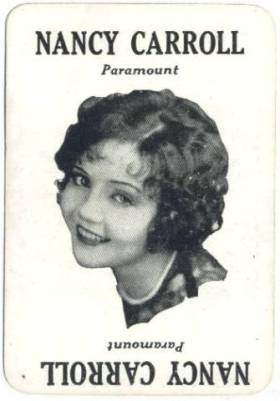 “It sneaks up on you, this love business,” Charlie (Ned Sparks) says to Hallie (Nancy Carroll).
“It sneaks up on you, this love business,” Charlie (Ned Sparks) says to Hallie (Nancy Carroll).
“Not on this baby it won’t,” says Hallie. “I know too much about men. I hate ‘em.”
“Some day you’ll marry one and then—”
“Me? Huh huh, no sir,” says Hallie. “The only interest I have in your fair sex is—”
“The old bankroll,” Charlie says, finishing Hallie’s sentence.
Hallie Hobart negotiates a three percent cut if she can use her charms to help Charlie sell his farm equipment to the Stones, the wealthiest wheat farmers in the country. Charlie had begun negotiations at one percent, but sharp witted Hallie countered by informing him that rival salesman Kent Carr (Jed Prouty) had already offered two percent towards swaying the same clients.
Hallie wheels and deals from a Chicago hotel where she also holds regular employment as a manicurist. Besides using the influx of farm equipment salesmen to her advantage she also holds an interest in Madame Bernstein’s dress shop on the ground floor of the hotel.
Everybody loves Hallie. She’s flirty, flighty, seemingly always in a good mood. Men gravitate to her naturally. She’s interested in money and has hopes of saving enough to move to Paris. Perhaps it’s because of those aspirations that this pre-Code dame stays sober. Doesn’t touch drink; hates the stuff.
Old Man Stone has made the mistake of sending his youngest son, David (Phillips Holmes), to Chicago to complete the deal that Charlie is so hot about. Charlie figures on Hallie as his best bet to warm the kid up: “You know when those bozos fall, they fall hard. And you’re the baby can make them stumble.”
The next morning Hallie grabs young Stone’s hand and leads him over to her table for a manicure. David Stone immediately impresses her as a rube, ripe for plucking, with talk of the Church his father has built, its Belgian imported bells and his glowing over the wheat back home.
“You’re in the big city now,” Hallie tells him.
“Sure am,” he laughs. Hallie gives him the hick glance.
The Devil’s Holiday was considered Phillips Holmes’ breakthrough role. Even more forgotten than Carroll today, Holmes was an electric young actor whose father preceded him as a famed stage and screen player. I’ve discussed Holmes in greater detail in other posts, including his follow-up hit Her Man (1930), so suffice it to say I’ve come to regard him as extremely neglected and unfairly forgotten.
 After Paramount built him into a star Holmes signed with MGM and appeared in support in movies such as Penthouse and the classic Dinner at Eight (both 1933). Problem is, nobody remembers him in those movies. His parts are too small and offer no chance to impress. Holmes later enlisted in the Royal Canadian Air Force and died tragically in a mid-air collision in 1942. He was only 35.
After Paramount built him into a star Holmes signed with MGM and appeared in support in movies such as Penthouse and the classic Dinner at Eight (both 1933). Problem is, nobody remembers him in those movies. His parts are too small and offer no chance to impress. Holmes later enlisted in the Royal Canadian Air Force and died tragically in a mid-air collision in 1942. He was only 35.
Holmes received great praise for his work in The Devil’s Holiday, but to be honest I thought he was better in some of his next few roles. His David Stone quickly becomes obsessed with Carroll’s Hallie, but it’s an obsession that plays as off-putting today. He immediately suffocates her and has his offer of marriage accepted for all the wrong reasons. Hallie acts according to plan and during her first meeting with David’s father (Hobart Bosworth) readily accepts a fat payoff to leave David behind forever. An accident occurs and in David’s recovery, overseen by Paul Lukas’ blowhard doctor, Holmes seems ready for a straightjacket.
Holmes comes off as too actorly, though he dominates any scene with anyone but Carroll. When his David proposes to Hallie, she’s dumbfounded. ”What? Aw, don’t be silly,” she tells him, brushing off the proposal. She tells him that he doesn’t know anything about her to which David naively replies, “I don’t care who or what you are. A woman’s life begins with her tomorrow, not with her yesterday. And your tomorrow’s with me, isn’t it?”
“A woman’s tomorrow,” she says, unable to believe the hokum he’s hurling at her. “Where did you read that?”
In the screenplay written by director Edmund Goulding, and unfortunately even the talented Holmes can’t stop us from being as incredulous as Carroll. The kid seems a little off.
Holmes has to spout a lot of romantic nonsense that surely looked better on the page and Carroll is at an advantage in spurning him. Her tone ranges from disinterested to disgust. Once married, in their bedroom at the Stone home, David continues to smother her with love but Hallie remains resistant. He takes her in his arms, Holmes’ hands working their way to the small of Carroll’s back, seemingly trapping her in his embrace, but Carroll keeps her arms in front of her, raised to her chest, subtly creating a situation where Holmes cannot fully claim her.
Goulding biographer Matthew Kennedy includes a few of the director’s thoughts on Carroll’s work at that time. After a handful of “bad pictures” his star was “like a horse that had been badly handled and resents the bit” and not “in a good frame of mind” when she began on The Devil’s Holiday. Goulding said of Carroll: “She was so determined to score a success in as a dramatic actress that tears of rage would come from her eyes when a scene did not go as it should. That’s exactly what I wanted. Nancy rose to genuine heights in her emotional scenes. She was convincing, forceful, true. And her success was magnificent” (91).
Many of Carroll’s best scenes come with the other members of David’s family. Unfortunately both his brother and his father are played by old-time silent screen stars who, despite going on to enjoy Hollywood careers longer than either Carroll or Holmes, seem completely lost during these early days of the talking picture.
James Kirkwood plays Holmes’ older brother, Mark Stone. This part originally showed some promise as Kirkwood arrives after receiving word that his little brother has been hooked by city girl Carroll. He corners her and remains firm despite her friendly manner. He works his way up to this humdinger:
 “The law of this country drove your kind off the streets, they drove you out of your dives, and where did it drive you to? To places like this and clothes like that.”
“The law of this country drove your kind off the streets, they drove you out of your dives, and where did it drive you to? To places like this and clothes like that.”
Hallie is incensed and Carroll is awesome in breathing her fire. She heads towards the door, turns to him and threatens him: “I’ve got people in this town that would cut your tongue out for half what you said to me, see? So keep out of my way!” Unfortunately nothing ever comes of those words.
As The Devil’s Holiday progresses it hints at some form of attraction between Hallie and Mark, who can’t stand each other just a little too much, but those strong emotions never develop into anything more. Turns out, they just really dislike each other. Carroll tosses off another great line when Holmes tries to sell her character on how wonderful rural life is. She thinks it’s depressing and ages you before your time. She chooses Mark as her example: “Look how it got that brother of yours. That Mark,” she says, spitting his name out as if it were a curse. She sneers and adds, “That one.”
The deeper we get into The Devil’s Holiday the more irritating Kirkwood becomes. He’s given one violent action scene, which he plays as a convincing Frankenstein’s monster, grunt and all, but winds up blathering worse than his younger brother during a scene with Lukas and practically spoils a climactic scene just by being in the shot. He has no dialogue, but stands awkwardly with his head slightly bowed, hands crossed over his waist, knees bent and looking like he needs a bathroom.
Hobart Bosworth is Ezra Stone, father of Mark and David. Bosworth was born in 1867 (only eight years before Kirkwood) and had been on the stage since the late 1880s. He entered movies in 1908 and was a major silent star over the next decade. He continued acting in supporting roles through 1942 and died the following year at age 77. I thought he had a foot in the grave here.
Bosworth delivers his lines with no emotion and his voice sort of wavers or vibrates as he speaks. Every syllable of every word is enunciated without thought of contraction or any other form of slang or abbreviation. He sounds ghostly. He does have a mean scowl which he breaks out on Carroll a few times. Unlike Kirkwood, Bosworth is wonderful at being silent.After being introduced to his son’s new wife Ezra Stone asks to speak with her privately. He’s willing to give the supposedly wanton girl the benefit of the doubt, but soon sees that older son, Mark, was right about her. He asks her what part of the country she’s from. Hallie tells him Iowa. And that suddenly, the jig is up.
“Iowa. Well, well. Do you love David?” Bosworth does nothing with line. It comes out as though he doesn’t understand English and is just parroting words phonetically off a page. It’s so bad that it kind of works because it’s almost jaw-dropping. Hallie seemed as surprised as I was.
Around the dead weight of Bosworth and Kirkwood we have Holmes, an actor working at a performance, though skillfully at times, and Carroll, who just is. Holmes spouts the melodrama and Carroll reacts natural as can be, building Hallie Hobart into a complicated character who loses all of that joy she possessed earlier in the film and is disturbed by the fact that she feels something for David, even after taking the payoff from his father.
Another great scene from Carroll comes after she’s returned to her room at the hotel and throws a party to celebrate her now impending trip to Paris. Charlie returns to find his old friend changed. She’s sitting when the phone rings so he answers for her. “It’s the baggage man, about your trunk.” Hallie takes phone from him raising the pieces to her mouth and ear, pauses, just a moment, but instead of speaking she just flings the phone onto the floor. “Ohh, I don’t want to talk to him,” she says. She’s drained. Then she rises to quick anger and kicks Charlie out of her room.
The Devil’s Holiday was written and directed by Edmund Goulding. The lead role of manicurist Hallie Hobart was originally intended for Broadway star Jeanne Eagels, who had just scored on film in The Letter (1929). When Eagels died Goulding hoped to cast either Gloria Swanson, who had just starred for him in The Trespasser, or Nancy Carroll. Up until this time Nancy Carroll was known for singing and dancing in lighter roles, but the tone of period media seemed to be tiring of her flapper act. The Devil’s Holiday would be her most dramatic role to date and Carroll surprised almost everyone by knocking it out of the park.
For her work on The Devil’s Holiday Nancy Carroll received an Academy Award nomination for Best Actress in a Leading Role. In a field that also included Ruth Chatterton, Gloria Swanson and Greta Garbo, Norma Shearer was the winner for The Divorcee. It’s said that Nancy Carroll was a very close second for her performance as Hallie Hobart.
If not for Carroll, and to a lesser degree Phillips Holmes, The Devil’s Holiday would be just another stale early talkie. The opening scenes in Hallie’s hotel are wonderful and the ending works because of the two young stars, especially Carroll. In between, when we shift from the city to the country, the Stone family setting has an old-fashioned feeling that reminded me of the scenes of home life in Way Down East (1920). Populated by actors who belonged back there.
Other players of note in The Devil’s Holiday include ZaSu Pitts as a switchboard operator who shares her only scene with Ned Sparks. Sparks is good as Hallie’s friend Charlie and shares quite a bit of fun banter with Carroll in their scenes together. Morgan Farley plays Monk McConnell, for some reason named Monkey in the credits, but nothing comes of that or the character, who was wholly unnecessary. The singer Morton Downey makes a brief appearance as a tenor who is said to have an interest in Hallie, but he’s also inconsequential. I’d feel more confident with a prescription recommending Mom’s chicken soup over anything that Paul Lukas’ doctor might give me, but that isn’t Lukas’ fault. His diagnosis of David Stone: “He has what you would call a passion.” Good work, Doc Goulding.
Character actor Jed Prouty is also in this one as rival salesman to Sparks. His best scene is actually shared with Bosworth as he visits him out out on the farm the same Sunday that the newlyweds are due to arrive home.
“I don’t do business on Sunday,” old Ezra Stone tells Prouty’s Kent Carr.
“Well, in the city we sort of figure Sunday is sort of a holiday,” Carr explains, still hoping to pitch Stone.
“In the city, yes,” Stone acknowledges. “A devil’s holiday.”
While the visuals are city versus country in The Devil’s Holiday they’re just standing in for new and old, modernity and tradition. Unfortunately, Hallie has to eat a bit of humble pie to get what she wants but in doing so Nancy Carroll gets a scene that stands out as Oscar-bait today, even if intentions were more general in 1930.
The Devil’s Holiday is a Paramount film that has never been released on video and is not likely to show up on television. But as of this writing you can watch it on YouTube HERE. All it will cost you is about 80 minutes, well-worth the price for Nancy Carroll’s Academy Award nominated performance.
Cited
- Kennedy, Matthew. Edmund Goulding’s Dark Victory: Hollywood’s Genius Bad Boy
Madison: University of Wisconsin, 2004.

Film Daily trade ad for THE DEVIL’S HOLIDAY includes some snippets of critical praise. From the May 15, 1930 edition.
[phpbaysidebar title=”Stars of Devil’s Holiday on eBay” keywords=”Nancy Carroll,Phillips Holmes,Hobart Bosworth,Ned Sparks” category=”45100″ num=”5″ siteid=”1″ sort=”EndTimeSoonest” minprice=”39″ maxprice=”599″ id=”2″]


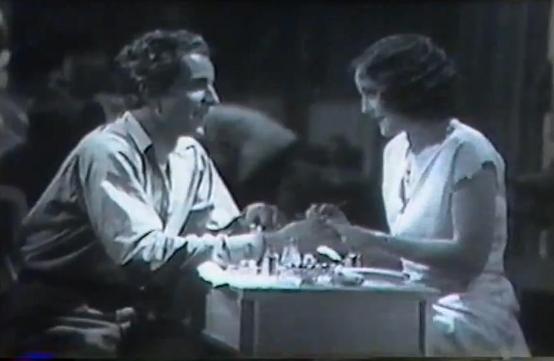


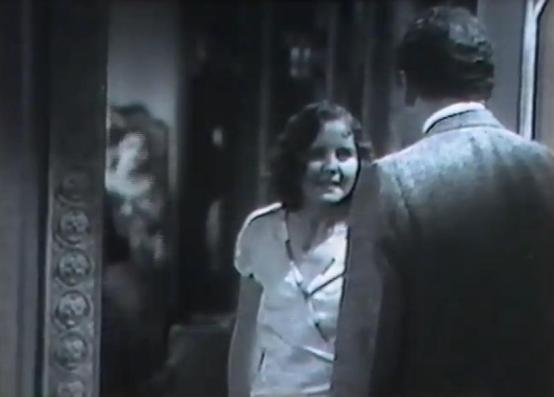

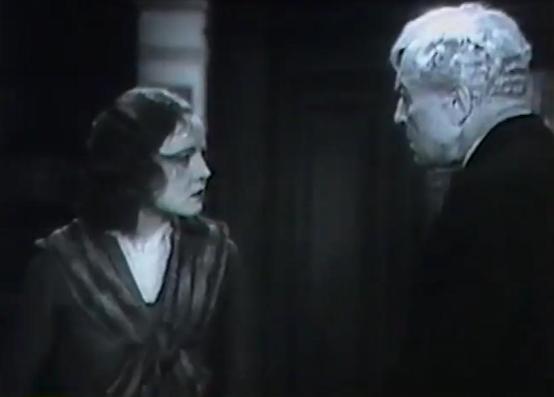
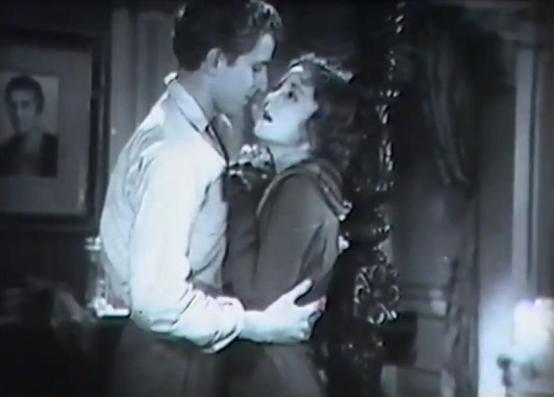


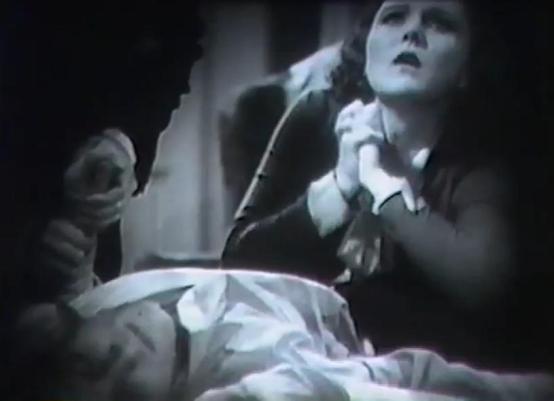

Leave a Reply